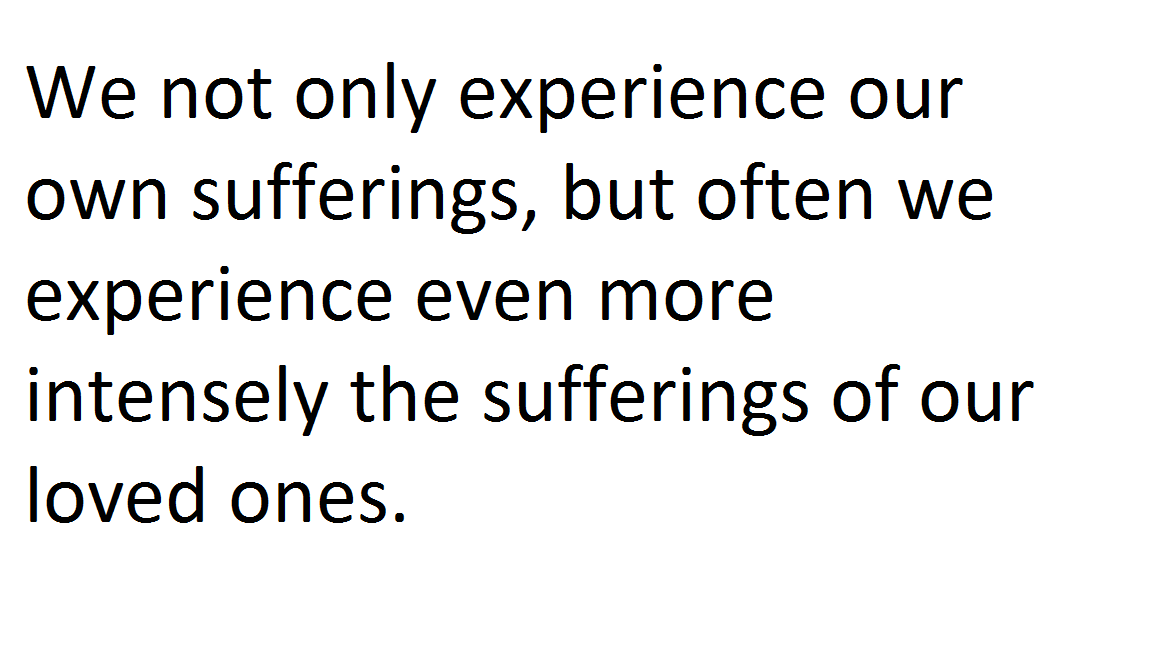Blessed are those who mourn, for they shall be comforted. (Mt 5:4)
God’s mercies are always greater than our troubles. (St. John Chrysostom)
One is almost tempted to think that this promise of comfort somehow doesn’t cut it, doesn’t reach the extent and the weight of the mourning. For when we think of someone mourning, we think of grief, tears, lamentations, deep sorrow. And indeed, some of the greatest sufferings in our lives involve our marriages and families: arguments, illnesses, difficult relationships, and deaths. We not only experience our own sufferings, but often we experience even more intensely the sufferings of our loved ones. In the face of our anguish, what does it even mean to be comforted anyway?
 As it happens, Scripture talks about comfort all the time. St. Paul writes: Blessed be the God and Father of our Lord Jesus Christ, the Father of mercies and the God of all comfort, who comforts us in all our afflictions, so that we may be able to comfort those who are in any affliction, with the comfort with which we ourselves are comforted by God (2 Cor 1:3-4); Isaiah writes: Comfort, comfort my people, says your God. Speak tenderly to Jerusalem, and cry to her that her warfare is ended, that her iniquity is pardoned, that she has received from the Lord’s hand double for all her sins (Is 40:1); St. John writes: And I will pray the Father, and he will give you another Counselor, to be with you for ever, even the Spirit of truth, whom the world cannot receive, because it neither sees him nor knows him; you know him, for he dwells with you, and will be in you (Jn 14:16).
As it happens, Scripture talks about comfort all the time. St. Paul writes: Blessed be the God and Father of our Lord Jesus Christ, the Father of mercies and the God of all comfort, who comforts us in all our afflictions, so that we may be able to comfort those who are in any affliction, with the comfort with which we ourselves are comforted by God (2 Cor 1:3-4); Isaiah writes: Comfort, comfort my people, says your God. Speak tenderly to Jerusalem, and cry to her that her warfare is ended, that her iniquity is pardoned, that she has received from the Lord’s hand double for all her sins (Is 40:1); St. John writes: And I will pray the Father, and he will give you another Counselor, to be with you for ever, even the Spirit of truth, whom the world cannot receive, because it neither sees him nor knows him; you know him, for he dwells with you, and will be in you (Jn 14:16).
The word “Counselor” in John’s Gospel may also be translated “Advocate,” “Helper,” “Paraclete” (which is simply the Englishification, if you will, of the Greek word), or even “Comforter.” At any rate, in each of these passages it’s the same word (parakaleō) being used over and over again.
 But let’s look a little closer: in 2 Corinthians, the comfort is said to come from the Father, who is “the God of all comfort”; in Isaiah, the coming comfort is the Incarnation, when the very Word of God takes human flesh to redeem us—it is Christ who brings the comfort of redemption to a people afflicted by sin (here the word almost seems too weak!); and in John’s Gospel, the Holy Spirit is the great Comforter who comes to dwell within us. It is therefore not at all a stretch to say that the comfort with which those who mourn will be comforted is God himself.
But let’s look a little closer: in 2 Corinthians, the comfort is said to come from the Father, who is “the God of all comfort”; in Isaiah, the coming comfort is the Incarnation, when the very Word of God takes human flesh to redeem us—it is Christ who brings the comfort of redemption to a people afflicted by sin (here the word almost seems too weak!); and in John’s Gospel, the Holy Spirit is the great Comforter who comes to dwell within us. It is therefore not at all a stretch to say that the comfort with which those who mourn will be comforted is God himself.
This is good news for marriages and families. It’s already been mentioned that some of life’s greatest mourning happens in our married and/or family life, but sometimes spouses and families seem incapable of adequately consoling our sorrow. But we learn from Scripture that those who mourn are comforted with the very life of the Trinity, a comfort that reaches to the deepest depths of our being and raises us up to the heights of beatitude.
~
This series is a guest contribution by a Dominican student brother who has been fulfilling his pastoral ministry assignment by serving as an intern at the USCCB’s Secretariat for Laity, Marriage, Family Life, and Youth.

Leave a Reply